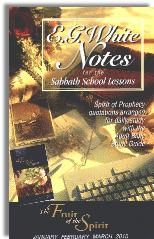|
||||||||||||||
Commentary on "The Fruit of the Spirit is Goodness"
Day 3: Monday, February 8, 2010
Overview
In Monday’s lesson the author discusses how the word “good” has been loosely and inappropriately described of people who seem good, but at the core are “rotten”. He states how we must define goodness according to God, because even the worst of people can do good deeds.
Observations
This problem the author addresses, that there are evil people capable of doing good acts or deeds, is precisely why “goodness” CANNOT be defined by action as he stated in Sabbath’s lessons (see commentary from Sabbath’s lesson). But while he acknowledges this problem in Monday’s lesson, he makes no indication that the problem is a result of his definition of goodness. Or, even more noticeably, he makes no response at all to the argument that there are indeed evil people who are capable of doing “good deeds”. He doesn’t address it at all, but rather leaves the reader to ponder by writing, “The point is that even the worst people can do kind deeds. And at the same time, who hasn’t seen really good people, when pushed, do some pretty bad things?”
So, how do we respond to this problem, that non-believers can appear good, even when there is no evidence of the Holy Spirit in their lives?
First, as stated in Sabbath’s lesson commentary, goodness cannot be defined just by action. Goodness is not a discipline that a human without the Holy Spirit can obtain. It is only the natural result of being born again.
Second, goodness as described in Galatians 5:22, does not mean “moral” or “altruistic”. There is the greek noun chrestotes, which means benevolence or kindness. Thayer defines chrestotes as, “moral goodness, integrity” (Lexicon, p. 672). Agathosune, as discussed in Sabbath’s commentary (refer to notes), is best translated as “goodness” in the sense of active goodness or beneficence. It stresses conduct, whereas chrestotes stresses disposition. According to Thayer and William Barclay, agathosune occurs only in Biblical writings, and not in any secular writings. Therefore, this word must be one that speaks of a holy goodness, a purity that can only occur in those who follow God. William Barclay says, “Agathosune might, and could, rebuke and discipline; chrestotes can only help. Trench says that Jesus showed agathosune when He cleansed the Temple and drove out those who were making it a bazaar; but He showed chrestotes when He was kind to the sinning woman who anointed His feet” (Daily Study Bible Commentary, pg. 51). This agathosune (goodness) is the word used in Galatians 5:22 in referring to the fruit of the Spirit.
It is interesting to note that while kind goodness is good, it’s the “strong” goodness that the Holy Spirit gives us when we belong to God. Natural man is incapable of having agathosune goodness. Good actions and good deeds cannot replicate the power and strength and “goodness” that the Holy Spirit brings to one’s life who is fully surrendered to God.
Summary
- One cannot judge the heart of a person just based off of their actions.
- Goodness as described in Galatians 5:22 is not merely defined by good deeds.
- Agathosune (from Galatians 5:22) is more than being moral, altruistic, or having an excellence of character. It is a good that only comes from God.
GO TO DAY 4
Copyright 2010 BibleStudiesForAdventists.com. All rights reserved. Revised January 25, 2010. This website is published by Life Assurance Ministries, Glendale, Arizona, USA, the publisher of Proclamation! Magazine. Contact email: BibleStudiesForAdventists@gmail.com.
The Sabbath School Bible Study Guide and the corresponding E.G. White Notes are published by Pacific Press Publishing Association, which is owned and operated by the Seventh-day Adventist church. The current quarter's editions are pictured above.
Official Adventist Resources
Standard Edition Study Guide Week 7
Teacher's Edition Study Guide Week 7
Easy Reading Edition Study Guide Week 7
Search the Complete Published Ellen G. White Writings


